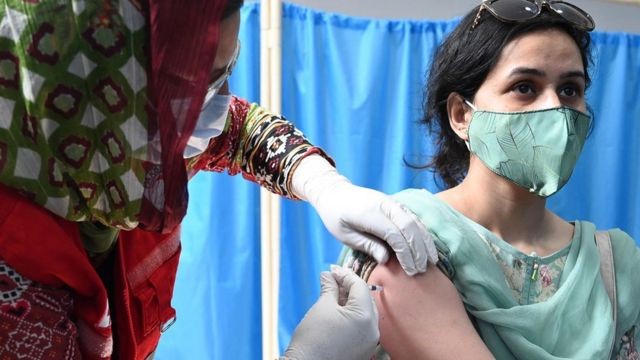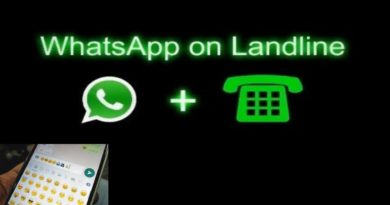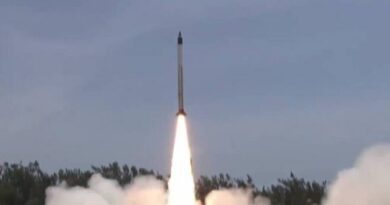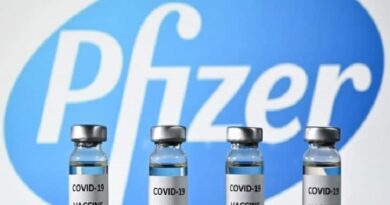Corona Vaccine: Can I Get Covid Even After Taking the Vaccine?
The Prime Minister of India, Narendra Modi, in his address to the country on June 7, 2021, has said that from June 21, free vaccine will be given to all people above the age of 18 years across the country.
At present, more than 23 crore doses of corona vaccine have been given to people across the country. While the outbreak of the second wave of corona infection in the country seems to be decreasing, there is a continuous demand to speed up the vaccination campaign.
In such a situation, there will be many questions in your mind regarding the vaccine. Read their answers.
Who is Eligible for the Covid Vaccine?
Everyone above the age of 18 is eligible for the Covid vaccine.
People above 18 years of age have been included in the third phase of the Covid vaccination campaign, which started from May 1.
The first phase of the Covid vaccination campaign started from January 16, 2021, in which health care workers and front line workers were given priority in giving the vaccine.
The second phase started from March 1, 2021 when people above 45 years of age were included in it.
After the permission of the Indian Drugs Controller General of India, the second and third trials of Covaccine are being done in children aged 2-18 years. After this result, any decision on the vaccination of people below 18 years of age will be possible.
How can you register for the COVID Vaccine?
To get the Covid-19 vaccine in India, one has to register on the Kovin platform, a facility run by the Government of India. You can also register for the vaccine on the Arogya Setu app.
If you face any problem in online registration, you can call the national helpline ‘1075’ and ask any query related to Covid-19 vaccination and Kovin software.
If you can’t make an appointment online, you still have an option. Vaccine centers have the facility to conduct a limited number of on-spot registrations per day. Meaning you can also go directly and register there. However, it is advisable to make an online appointment through the Covin portal to avoid waiting and queues.
To register for the vaccine, visit the website cowin.gov.in and enter your mobile phone number. You will get a one time password on your number. Enter this number in the OTP box written on the website and click on the Verify icon. This will verify it.
After this you will see the registration page. Enter your details here and also share a photo ID. If you already have any disease like- sugar, blood pressure, asthma etc., then write its information in detail.
When this information is complete, click on the icon written register. As soon as this registration is completed, you will see your account details on the computer screen. From this page you can set your appointment date.
I have taken the first dose, for the second dose?
Yes, you will have to make an appointment again for the second dose of the vaccine. Keep in mind, after taking the first dose, an appointment for the second dose will not be automatically scheduled. With the help of the Covin portal, you will have to take an appointment again.
Which vaccine has been approved in India?
The vaccine that is being administered in India to protect against Covid-19 has been approved by the Drug Controller General of India (DCGI). These vaccines are – Kovishield, Covaccine and the vaccine developed in Russia Sputnik V. It is being said about Sputnik V that this vaccine gives about 92% protection against Covid-19.
Plans are underway to start production of Russian vaccine Sputnik V in India. Russian Direct Investment Fund (RDIF) and Indian pharmaceutical company Panacea Biotech have signed an agreement for this.
While Covishield is actually Oxford-AstraZeneca’s version, Covaccine is completely India’s own vaccine which is also being called ‘Indigenous Vaccine’. Covishield is being developed in India by Serum Institute of India Company.
At the same time, Covaccine has been made by Hyderabad-based Bharat Biotech Company in association with the Indian Council of Medical Research (ICMR).
Is covid vaccine free?
Indian Prime Minister Narendra Modi has said in his announcement on June 7, 2021 that all people above 18 years of age in the country will be given free vaccine from June 21, 2021.
Earlier, the vaccine was being available free of cost in central government hospitals and many states including Uttar Pradesh, Assam, Sikkim, Bihar, Chhattisgarh, Madhya Pradesh, Kerala, Maharashtra, Delhi, had said that all those above 18 years of age had Vaccines will be given free of cost to the people.
People in private hospitals will have to pay for this. Covishield was being provided to private hospitals at Rs 600 per dose and Covaccine at Rs 1200 per dose.
Covishield and Covaccine have said that they will supply to the central government at the rate of Rs 150 per dose. While the cost of Covishield was fixed at Rs 300 per dose and Rs 600 per dose of Covaccine for the state governments.
Is the covid vaccine safe?
Most experts are of the opinion that the safety reports of almost all the vaccines made to fight corona so far have been correct.
There may be a slight fever due to vaccination or headache or pain at the injection site.
However, abnormal blood clots have been found in the brains of many people who have received the Oxford-AstraZeneca corona vaccine.
“Cerebral venous sinus thrombosis” (CVST), ie, blood clots in the veins between the layers of duramatter on the outer surface of the brain, have been observed in many people after receiving the vaccine.
Doctors say that if a vaccine is effective up to 50 percent, then it is kept in the category of successful vaccine. Doctors also say that the person getting the vaccine will have to keep a close watch on any minor changes in his health and share any changes with a doctor immediately.
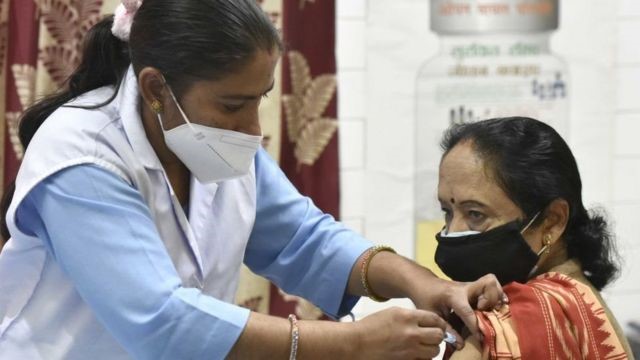
Can I get covid even after taking the vaccine?
There is no evidence that any of the current COVID-19 vaccines can completely prevent infection.
One of the vaccines being administered in India is Covishield, whose international clinical trials show that it is up to 90% effective after two doses of the vaccine. At the same time, the second vaccine is Covaccine, whose preliminary data from Phase III trials shows that it is 81% effective.
Apart from this, now Russia’s Sputnik V has also been approved for use in India. According to the results of the trial of this vaccine, after the first dose, this vaccine gives about 92% protection against Covid-19.
That is, taking any vaccine reduces the risk of infection to a great extent. However, the vaccine protects against infection and its serious effects to a great extent. Research studies so far have shown that the infection did not prove to be serious in most cases in people exposed to infection after taking the vaccine.
According to the guidelines of the Government of India, the use of social distancing, face cover, mask, hand sanitization is advised even after taking the dose along with the vaccine center.
How does the vaccine work?
A vaccine prepares your body to fight a disease, virus or infection. Vaccines contain weakened or inactivated parts of an organism that cause disease.
These prompt the body’s ‘immune system’ i.e. the immune system to recognize the infection (invading virus) and make antibodies in the body against them which help our body to fight the external attack.
The negative effect of getting the vaccine is rarely on people, but some people may have to face its side effects. Mild fever or itching are common side effects.
Only after two to three weeks of getting the vaccine, you develop immunity to fight that disease.
The US Centers of Disease Control and Prevention (CDC) says that vaccines are very powerful because they do not cure a disease, but prevent them from occurring, unlike most medicines.
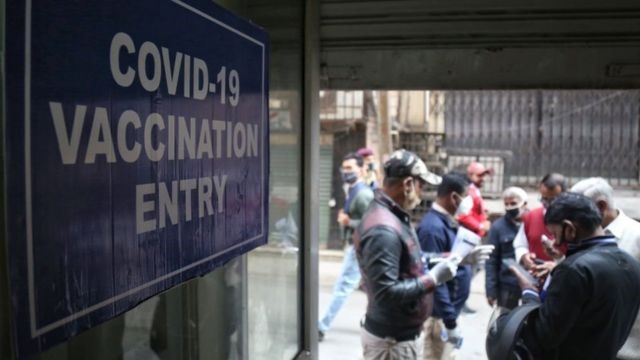
When should I get my second dose of vaccine?
A second dose of Covaccine is recommended at an interval of 4 to 6 weeks after the first dose. The Government of India has maintained the interval of the second dose. Whereas the time has been extended for the second dose of Covishield.
Earlier the interval between two doses for Covishield was 4 to 8 weeks but now it has been increased to 12 to 16 weeks. Keeping this in mind, you can choose the date of the second dose of the vaccine according to your convenience.
In the case of Sputnik vaccine, a second dose may be given after three weeks.
The world has started taking different vaccines in two doses and many researches are going on about it, but till now no provision has been made in India regarding this. Till then, keep in mind that take the second dose of the same vaccine as the first one. If covaccine was applied earlier also, then get the same vaccine for the second time and if you got covishield for the first time, then get the same vaccine for the second time also.
When going to get the second vaccine, carry the vaccine certificate given after the first dose. This vaccine certificate is printed by the vaccine center itself. Apart from this, you can also remove this certificate from the Kovin portal. For this, you have to enter the same mobile number which was entered at the time of registration.
Can I get the second dose of the vaccine administered in another state/district?
Yes, you can get the vaccine done in any state/district or city/metropolis. It is just that you will be able to get the vaccine only at those centers where the same vaccine is being given, which you got during the first dose.
Can I take two different vaccines?
The US health agency CDC says that the best vaccine is the one that is first available to you because it is safe, effective and reduces your risk of falling ill.
Studies are still going on on the effects of taking a different vaccine in the second dose of the vaccine.
For how long will the vaccine protect me from covid?
According to the Indian Union Ministry of Health and Family Welfare, the duration of protection from the vaccine has not yet been decided. However, according to a study conducted on 1700 people in the UK Biobank, 88% of people were seen to have active antibodies even after six months after developing the antibody. At the same time, the US Center for Disease Control and Prevention (CDC) said that nothing can be said exactly about how long people will be safe after taking the vaccine.
Are all vaccines effective against different variants of covid?
The World Health Organization (WHO) has named different variants of corona infection. The most inherited variant in the UK is now referred to as alpha, while the variant found in South Africa is called beta and the first variant found in Brazil is called gamma. At the same time, the first variant seen in India is being called Delta.
A study by the All India Institute of Medical Sciences (AIIMS) and the National Center for Disease Control (NCDC) has found that people who had received both the Covidshield and Covaccine doses were also found to have the delta variant for the first time in India in October, 2020. Corona virus can infect. But according to scientists, the Covid vaccine will help in preventing the variants of corona.
According to a research study published by Professor Gupta and his fellow researchers in the journal Nature, some variants will definitely survive these vaccines and such variants will be controlled by the use of next generation vaccines and alternative viral antigens.
How is the vaccine made and who fixes it?
When a new pathogen such as a bacterium, virus, parasite or fungus enters the body, a subset of the body called the antigen begins to produce antibodies to fight it.
A vaccine consists of a weakened or inactivated part of an organism that causes disease.
These prompt the body’s ‘immune system’ i.e. the immune system to recognize the infection (invading virus) and make antibodies in the body against them which help our body to fight the external attack.
But now new methods are also being used to develop vaccines. These new methods have also been tried in making some corona vaccines.
The process of manufacturing any vaccine in India is based on the standards set by the World Health Organization, all of which are reviewed by a government body called the ‘Drug Controller General of India’.
The bulk manufacturing of a vaccine is allowed only after getting the green signal from the DGCI.
Keeping the quality control in mind, standards for bulk manufacturing of vaccines are prepared and checking is done from time to time through scientists and regulatory authorities to maintain quality.

